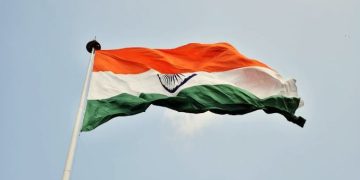While there are no ironclad laws of politics, two tendencies in the United States – midterm swings against the incumbent party (the ‘midterm blues’) and the negative electoral effects of inflation and unemployment (‘political business cycles’) – come pretty close. US President Joe Biden (whose approval rating has sunk for the past year) and the Democrats should not be surprised if they suffer a massive rout in the 2022 midterm elections.
But other long-accepted political truths have been discarded. For decades after World War II, two-party competition within a majoritarian system was thought to have a moderating effect. According to the celebrated “median voter theorem,” originally proposed by the economist Duncan Black and then later by the political scientist Anthony Downs, if one party veered too far from the center, it would pay for it at the polls.
Imagine that the US electorate has a range of views about the appropriate level of the federal minimum wage. Some on the right think there should be no federal minimum wage at all, whereas some on the left think it should be at least $18 per hour. Now suppose that the “median” of this distribution of voters points to a preferred minimum wage of $12 per hour (the rate above and below which half the electorate falls).
In an election where the minimum wage is the main issue, if the Republican Party listens to its most vocal members and promises to abolish the minimum wage, the Democrats should be able to secure an easy victory by campaigning for a minimum wage of, say, $13 per hour. It then follows that the Republicans will moderate their approach in the next election, disregarding their vocal base if necessary. And since a small amount of moderation ($8 per hour, say) will not get them very far, they will have to move to where the median voter is: $12 per hour.
Downs’ observation was powerful, not just because of its theoretical elegance but also because it seemed to explain US electoral politics for quite a while. The parties became so close on most issues as to entrench a moderate “liberal consensus.” While some critics saw this as a “failure of democracy,” many others regarded it as a feature of the system, not a bug.
Still, cracks were apparent even in the median voter theorem’s heyday. Moderate policies require moderate candidates, but primaries require candidates first to win over the most animated and committed of the party’s base. Hence, Republicans nominated Barry Goldwater for the 1964 presidential election, even though his views were far to the right of the mainstream; and the Democrats then nominated the left-leaning George McGovern in 1972. Both lost, but their candidacies were signs of things to come.
More recent evidence indicates that the median voter theorem no longer has much purchase on American politics. If it still applied, we would see politicians who are elected in close contests going on to maintain moderate positions in office. But research by economists David Lee, Enrico Moretti, and Matthew Butler shows that something quite different has been happening. Congressional Republicans and Democrats who were elected by only narrow margins still vote just like all other Republicans and Democrats, showing no signs of moderation.
The median voter theorem assumes that voters switch “fluidly” between candidates, depending on their policy platforms. But in the real world, voters tend to base their decisions on a mix of other factors. Which candidate seems more credible, competent, and authentic? Who would I want to be in charge during a national emergency? Who would I want to have a beer with? And party loyalty is deeply ingrained for many voters.
These variables complicate matters greatly. Suppose Republicans listen to their most extreme members and shift their platforms further to the right. In this scenario, Democrats could indeed gain by moving toward the middle, provided that they don’t compromise their own credibility. But the problem is that the dynamic playing out among Republicans is likely also to play out among Democrats, with their primary voters pushing them to the left. When the Republicans embrace extremism, many Democrats will conclude that they can pursue their favorite left-wing agenda items and still have a chance of winning.
Add to this the pernicious effects of corporate money and social-media filter bubbles (where extremist ideas get amplified), and you get something very different from self-moderating two-party competition. US politics today is characterised by deep polarisation, with Republicans moving further to the right, and Democrats further to the left.
The fall of the “median voter” is not all bad news, of course. Sometimes, the middle of the political spectrum can become convinced of something that simply isn’t true (for example, “trickle-down economics”), or it can stop caring about marginal groups. When the median voter theorem reigns supreme, not much can be done about such failings. But in a world where it no longer applies, activists can shift the debate, elevating issues that both parties have long ignored – such as the plight of blue-collar workers who lost their jobs to cheap imports or automation; the decline of the middle class; or the far-reaching consequences of systemic racism.
Where does that leave us with the near-iron laws of politics mentioned above? When both parties are near the middle, macroeconomic performance or small policy differences can drive big midterm electoral swings. But the situation is quite different when one party goes off the deep end, as Republicans have done, and even more so when a right-wing Supreme Court is dismantling rights that generations of Americans have long taken for granted.
This level of extremism could create an opening for Democrats to form a broader coalition (the Court, after all, is increasingly at odds with the American public). But to do that, Democrats need to strike the right balance between the bread-and-butter issues that matter to most Americans and an agenda countering Republican extremism. That means avoiding obviously divisive positions (for example, “defund the police”). Even – or especially – when the median does not hold, broadening the base is good politics.
The writer is Professor of Economics at MIT. ©Project Syndicate.






































